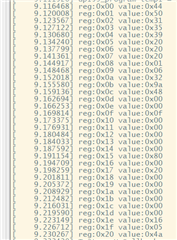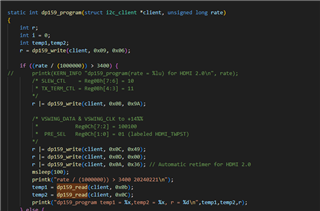SN65DP159RGZR as an HDMI application
The [1:0] bits of the 0x0C register seem uncontrollable. In the program, these two bits are written to 01 and read as 00
It is already in IIC mode, and the HDMI signal is normal

This thread has been locked.
If you have a related question, please click the "Ask a related question" button in the top right corner. The newly created question will be automatically linked to this question.
SN65DP159RGZR as an HDMI application
The [1:0] bits of the 0x0C register seem uncontrollable. In the program, these two bits are written to 01 and read as 00
It is already in IIC mode, and the HDMI signal is normal

Hey,
Can you send the full register config of the device?
I want to have a look a what mode the device is in. This could be due to the redriver/ retimer switching ability of this device.
Additionally, what is the data rate you are working with?
Hey
register config:

hdmi timing:
yeah,this issue occur on multiple devices。
This is the dp159 driver code,
/*
* dp159 redriver and retimer
* Copyright (C) 2016, 2017 Leon Woestenberg <leon@sidebranch.com>
*
* based on code
* Copyright (C) 2007 Hans Verkuil
*
* This program is free software; you can redistribute it and/or modify
* it under the terms of the GNU General Public License as published by
* the Free Software Foundation; either version 2 of the License, or
* (at your option) any later version.
*
* This program is distributed in the hope that it will be useful,
* but WITHOUT ANY WARRANTY; without even the implied warranty of
* MERCHANTABILITY or FITNESS FOR A PARTICULAR PURPOSE. See the
* GNU General Public License for more details.
*
* You should have received a copy of the GNU General Public License
* along with this program; if not, write to the Free Software
* Foundation, Inc., 675 Mass Ave, Cambridge, MA 02139, USA.
*/
#include <linux/module.h>
#include <linux/kernel.h>
#include <linux/i2c.h>
#include <linux/slab.h>
#include <linux/delay.h>
#include <linux/of.h>
#include <linux/of.h>
#include <linux/clk-provider.h>
MODULE_DESCRIPTION("i2c device driver for dp159 redriver and retimer");
MODULE_AUTHOR("Leon Woestenberg");
MODULE_LICENSE("GPL");
static bool debug;
module_param(debug, bool, 0644);
MODULE_PARM_DESC(debug, "Debugging messages, 0=Off (default), 1=On");
struct clk_tx_linerate {
struct clk_hw hw;
struct i2c_client *client;
struct clk *clk;
unsigned long rate;
};
static inline int dp159_write(struct i2c_client *client, u8 reg, u8 value)
{
int rc;
rc = i2c_smbus_write_byte_data(client, reg, value);
return rc;
}
static inline int dp159_read(struct i2c_client *client, u8 reg)
{
return i2c_smbus_read_byte_data(client, reg);
}
static int dp159_program(struct i2c_client *client, unsigned long rate)
{
int r;
int i = 0;
int temp1,temp2;
r = dp159_write(client, 0x09, 0x06);
if ((rate / (1000000)) > 3400) {
// printk(KERN_INFO "dp159_program(rate = %lu) for HDMI 2.0\n", rate);
/* SLEW_CTL = Reg0Bh[7:6] = 10
* TX_TERM_CTL = Reg0Bh[4:3] = 11
*/
r |= dp159_write(client, 0x0B, 0x9A);
/* VSWING_DATA & VSWING_CLK to +14%%
* Reg0Ch[7:2] = 100100
* PRE_SEL Reg0Ch[1:0] = 01 (labeled HDMI_TWPST)
*/
r |= dp159_write(client, 0x0C, 0x49);
r |= dp159_write(client, 0x0D, 0x00);
r |= dp159_write(client, 0x0A, 0x36); // Automatic retimer for HDMI 2.0
msleep(100);
printk("rate / (1000000)) > 3400 20240221\n");
temp1 = dp159_read(client, 0x0b);
temp2 = dp159_read(client, 0x0C);
printk("dp159_program temp1 = %x,temp2 = %x, r = %d\n",temp1,temp2,r);
} else {
// printk(KERN_INFO "dp159_program(rate = %lu) for HDMI 1.4\n", rate);
/*datasheet has 0 by default. 0x1 disables DDC training and only
* allows HDMI1.4b/DVI, which is OK*/
r |= dp159_write(client, 0x0B, 0x80); // SLEW_CTL = Reg0Bh[7:6] = 10
// TX_TERM_CTL = Reg0Bh[4:3] = 00
// VSWING_DATA & VSWING_CLK to +14%
// Reg0Ch[7:2] = 100100
// PRE_SEL = Reg0Ch[1:0] = 00 (labeled HDMI_TWPST)
r |= dp159_write(client, 0x0C, 0x48);
r |= dp159_write(client, 0x0D, 0x00);
// Automatic redriver to retimer crossover at 1.0 Gbps
r |= dp159_write(client, 0x0A, 0x35);
printk("rate / (1000000)) < 3400\n");
temp1 = dp159_read(client, 0x0b);
temp2 = dp159_read(client, 0x0C);
printk("dp159_program temp1 = %x,temp2 = %x\n",temp1,temp2);
}
temp1 = dp159_read(client, 0x0b);
temp2 = dp159_read(client, 0x0C);
printk("dp159_program temp1 = %x,temp2 = %x\n",temp1,temp2);
for(i=0;i<0x21;i++)
{
printk("reg:0x%02x value:0x%02x\n",i,dp159_read(client, i));
}
return r;
}
#define to_clk_tx_linerate(_hw) container_of(_hw, struct clk_tx_linerate, hw)
int clk_tx_set_rate(struct clk_hw *hw, unsigned long rate, unsigned long parent_rate)
{
struct clk_tx_linerate *clk;
clk = to_clk_tx_linerate(hw);
//printk(KERN_INFO "dp159: clk_tx_set_rate(): rate = %lu, parent_rate = %lu\n", rate, parent_rate);
clk->rate = rate;
dp159_program(clk->client, rate);
return 0;
};
unsigned long clk_tx_recalc_rate(struct clk_hw *hw, unsigned long parent_rate)
{
struct clk_tx_linerate *clk;
clk = to_clk_tx_linerate(hw);
//printk(KERN_INFO "dp159: clk_tx_recalc_rate(): parent_rate = %lu\n", parent_rate);
return clk->rate;
};
long clk_tx_round_rate(struct clk_hw *hw,
unsigned long rate, unsigned long *parent_rate)
{
struct clk_tx_linerate *clk;
clk = to_clk_tx_linerate(hw);
return rate;
};
struct clk_ops clk_tx_rate_ops = {
.set_rate = &clk_tx_set_rate,
.recalc_rate = &clk_tx_recalc_rate,
.round_rate = &clk_tx_round_rate,
};
static int dp159_probe(struct i2c_client *client,
const struct i2c_device_id *id)
{
struct clk_tx_linerate *clk_tx;
struct clk *clk;
struct clk_init_data init;
int ret;
int temp1,temp2;
/* Check if the adapter supports the needed features */
if (!i2c_check_functionality(client->adapter, I2C_FUNC_SMBUS_BYTE_DATA))
return -EIO;
if ((dp159_read(client, 0) != 'D') || (dp159_read(client, 1) != 'P')) {
dev_err(&client->dev, "Identification registers do not indicate DP159 presence.\n");
return -ENODEV;
}
dev_info(&client->dev, "probed\n");
// (void)dp159_write(client, 0x09, 0x0A);
// msleep(100);
// (void)dp159_write(client, 0x09, 0x02);
/* initialize to HDMI 1.4 */
(void)dp159_write(client, 0x0B, 0x80);
(void)dp159_write(client, 0x0C, 0x48);
(void)dp159_write(client, 0x0D, 0x00);
(void)dp159_write(client, 0x0A, 0x35);
/* allocate fixed-rate clock */
clk_tx = kzalloc(sizeof(*clk_tx), GFP_KERNEL);
if (!clk_tx)
return -ENOMEM;
init.name = dev_name(&client->dev);
init.ops = &clk_tx_rate_ops;
init.flags = 0; ///*flags | CLK_IS_BASIC*/;
init.parent_names = NULL;
init.num_parents = 0;
clk_tx->hw.init = &init;
/* register the clock */
clk = clk_register(&client->dev, &clk_tx->hw);
if (IS_ERR(clk)) {
kfree(clk_tx);
return PTR_ERR(clk);
}
/* reference to client in clock */
clk_tx->client = client;
clk_tx->clk = clk;
/* reference to clk_tx in client */
i2c_set_clientdata(client, (void *)clk_tx);
//dev_info(&client->dev, "DP159 retimer.\n");
ret = of_clk_add_provider(client->dev.of_node, of_clk_src_simple_get,
to_clk_tx_linerate(&clk_tx->hw));
if (ret) {
dev_err(&client->dev, "unable to add clk provider\n");
}
dev_info(&client->dev, "probe successful\n");
dev_info(&client->dev, "probe successful-----------------------0223a\n");
temp1 = dp159_read(client, 0x0b);
temp2 = dp159_read(client, 0x0C);
dev_info(&client->dev, "probe temp1 = %x,temp2 = %x\n",temp1,temp2);
return 0;
}
static int dp159_remove(struct i2c_client *client)
{
struct clk_tx_linerate *clk_tx;
clk_tx = (struct clk_tx_linerate *)i2c_get_clientdata(client);
if (clk_tx)
clk_unregister(clk_tx->clk);
return 0;
}
static const struct i2c_device_id dp159_id[] = {
{ "dp159", 0 },
{ }
};
MODULE_DEVICE_TABLE(i2c, dp159_id);
#if IS_ENABLED(CONFIG_OF)
static const struct of_device_id dp159_of_match[] = {
{ .compatible = "ti,dp159", },
{ /* sentinel */ },
};
MODULE_DEVICE_TABLE(of, dp159_of_match);
#endif
static struct i2c_driver dp159_driver = {
.driver = {
.owner = THIS_MODULE,
.name = "dp159",
.of_match_table = of_match_ptr(dp159_of_match),
},
.probe = dp159_probe,
.remove = dp159_remove,
.id_table = dp159_id,
};
module_i2c_driver(dp159_driver);
Are you able to use an external I2C controller other than the driver to read and write to the registers?
Unfortunately, we do not support software, so I will not be able to help you debug your driver code.
Hey, It seems that you need to have a valid clock at the IN_CLK pins to change these register values. It was just verified in lab.
The HDMI signal is normal, what do you mean by valid clock?
A valid clock meaning that you need to have HDMI traffic running through the device to change the values of the [1:0] bits of the 0x0C register